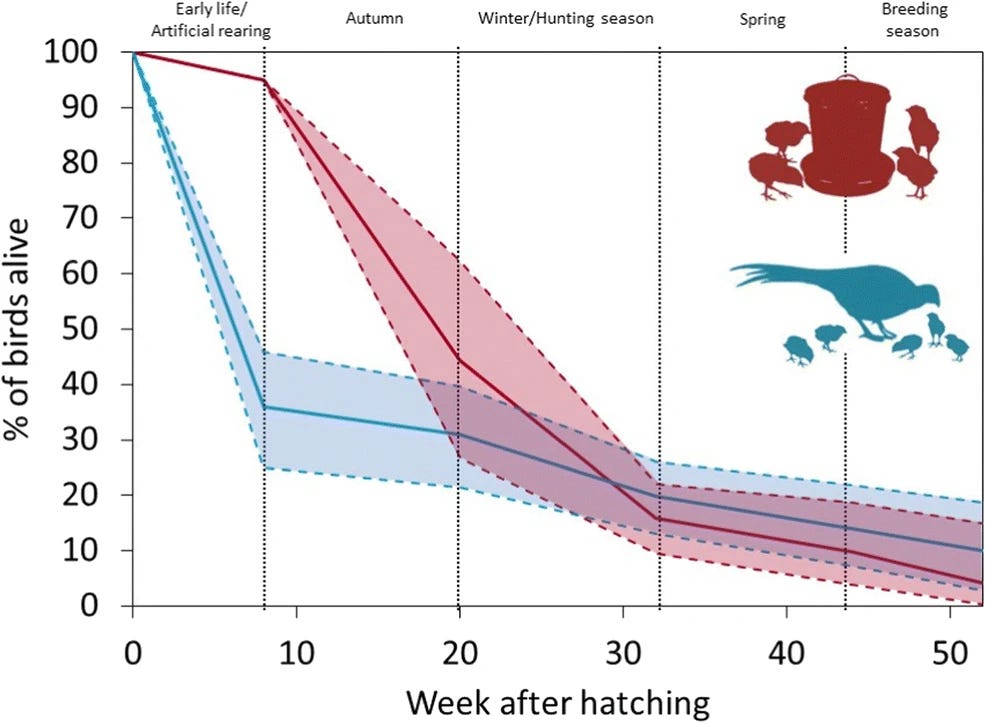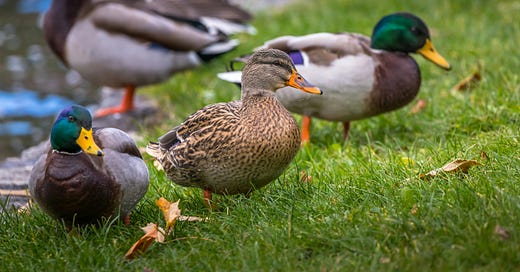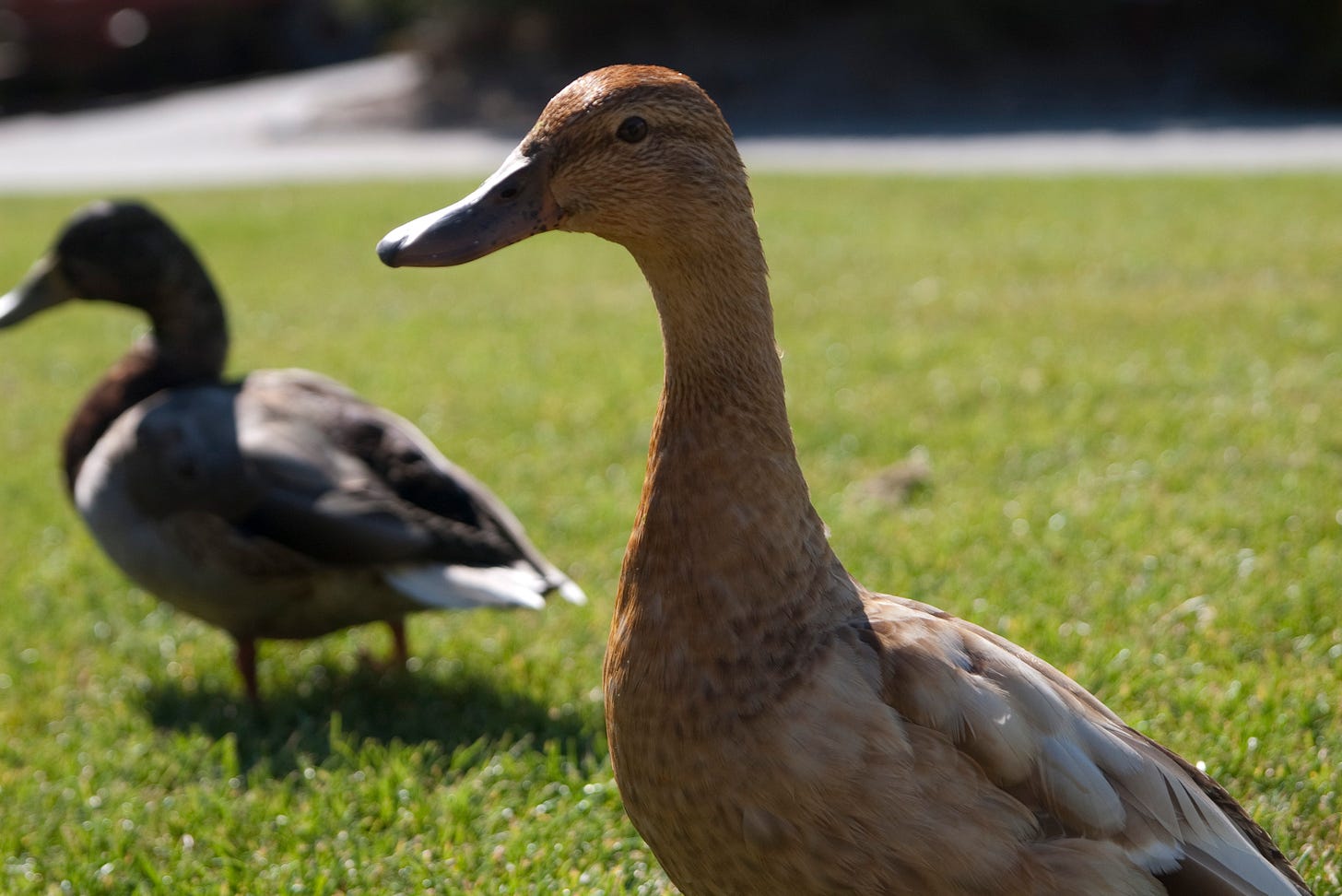A Vegan’s Case for Killing Animals
It will always be morally permissible to slaughter a few animals
Justifying the lesser status of animal rights in contrast to human rights is philosophically difficult. In particular, it is difficult for carnivores to justify denying animals the right to not be killed, while being against cruelty to them too. I wish to show in this short article that accepting the vegan position on animal rights grounds still permits the killing of animals. I should say from the outset this argument does not justify any instances of factory farming, or, buying meat from humane sources either. Instead, it will justify the slaughtering of a moderate number of poultry in a flock, and, a limited slaughter of pigs in a drive. Besides running your own small holding as I outline, a tiny number of instances of pheasant shooting and deer stalking maybe morally permissible too.
Let us accept along with Tom Regan and David DeGrazia that animal rights exist and contain the right not to be killed within them, because, according to the former thinker, the animal has a life which matters to them. We can think of the set of animal rights as very similar to human rights, although, their autonomy need not be respected. DeGrazia explains why the principle of autonomy, broadly understood as granting living things the power to decide their own fate, does not apply to animals: ‘But this principle [of autonomy] only applies to beings who have a substantial understanding of their own best interests and values; it does not apply to young children and animals, who…lack the reasoning and decision-making capacities that constitute that autonomy’. According to him this means ‘it is appropriate to make decisions, on behalf of young children and animals, that accord with their interests’.
In many instances of their lives, it will be in the interest of animals relative to their natural condition to be bred or managed by humans on the condition of some of them being slaughtered for their meat. According to this study from the Wilson Journal of Ornithology the mortality rate of mallard ducklings within 30 days of hatching is about 40%. Now, if you bred mallard ducklings and kept them in a big enclosure free from predators and in better than natural conditions and chose to slaughter 30% of them at 60 days old, then, every duck, in expected value terms, would be better off relative to the natural condition. In killing these animals no right of theirs is violated because their important interest in life has not been set back relative to the natural condition to which they are entitled (at least according to DeGrazia), i.e., have a right to, indeed, the ducklings’ interests would be positively advanced by human intervention. Were a duck to be raised and killed according to the outlined method then we can expect it to cost about £112.20.The same argument can be made for killing piglets, 48% of which die before the end of their first year (at least in Warsaw).
In practice, this argument hardly justifies eating any animals at all today. Maybe, I stress, maybe, pheasant shooting of humanely reared pheasant chicks could be justified by this (I don’t think most are humanely raised though). We’d have to make a number of assumptions however, e.g., that those that are shot suffer on average less than those who would otherwise die in the wild. The problem we can imagine is a pheasant being poorly shot and put into a painful condition then being eaten by a fox; here the overall amount of suffering has probably increased, offsetting the gain made on more life earlier on (from protection in an enclosure). Where you can go to a pheasant shoot, however, knowing the chicks have been brought up well and you can confidently make clean shots at them, given they are better off relative to the natural condition, see the total area of life under the man raised red line being of a greater size than under the wild born blue line, it is morally permissible to shoot them and eat them.

A favourite move of the vegans is to apply the carnivore’s reasoning concerning animals to mentally disabled humans in a very often successful attempt at a reductio ad absurdum. Does doing so work here? No. Imagine a plague swept the land with a mortality rate of 20% which would infect everyone and we could inject the seriously mentally disabled with a jab (who don’t have the capacity to consent) which would kill them in 0.2% of cases but otherwise make them immune to the plague; I think most people would say it is morally permissible to jab them because it reduces their expected mortality rate a hundred-fold. Granting the plausibility of this conclusion concerning the seriously mentally disabled, vegans must grant the plausibility of killing a few animals in a population in exchange for each being made better off in expected value terms too.
I suspect Kantian vegans may object to animals being used as a means to the human end of eating them, but I don’t think this stands up to scrutiny. First, Kant didn’t object to people being used as a means per se, rather, he objected to people being used as mere means. One of the ways people can stop themselves from being used as mere means is by consenting to the treatment of another, and, concerning animals, the moral proxy for consent is whether the treatment is in their interests, meaning, in the above examples, they are not being used as mere means in an objectionable sense. Second, Kant’s argument which rules out the destruction of free will on the ground it is the precondition of the value of everything else which enables him to rule out consensual gladiatorial contests and suicide simply doesn’t work with animals because they definitely don’t have free will in Kant’s sense.
Perhaps people would object to my duckling example because they would argue it is immoral to bring a being into existence which will not have a decent life, and, typically, ducklings’ lives are not decent. I think this is a plausible rule of morality, yet, I still doubt it applies to raising ducklings. Irrespective of this, there remains a number of wild animals which you could slaughter on the grounds I have outlined. For example, according to a study in Sweden there is a 42% mortality rate among fawns, 81% of which was due to takings by red foxes. Showing the brutality of nature: ‘The majority of the fawns (85%) were killed before 30 days of age and 98% before 40 days.’ These fawns were no doubt ripped to death, the fortunate ones having their neck immediately broken. Deer stalking of disabled fawns is definitely morally permissible as they would almost certainly be torn to bits: For the argument to work fox violence has to be crowded out by being killed with buckshot. An alternative would be to kill all the foxes then take just less than the foxes would have anyway.
Vegans should never ultimately wish for a world without the slaughter of animals for it is a Pareto improvement for every expected animal and human who is part of it, and, crucially, there is not a single animal rights violation created via the mentioned process either, so, even moral uncertainty cannot plausibly stand in the way of the conscientious carnivore tucking into the those animals which draw the short straw.





Interesting argument, but I don't think a deontologist should accept it. Generally I don't think that the natural level of suffering and death are directly relevant to rights. It wouldn't be permissible on deontology to kill your baby after 7 years, even if living conditions where you are are so rough that the expected life of a newborn is 5 years.
You object with a vaccine counterexample. But two things to this: Firstly, the risk is very small in your example. It probably wouldn't be permissible to give them the vaccine on deontology, if it had a 10% risk of death, even if the baseline is 20%. Secondly, in the vaccine example, the action you perform on each individual will be expected to help them. This is not the case when killing animals. Imagine that we instead sacrificed 10% (or even 0.2%) of the population in a human sacrifice ritual to stop the spread of the disease (and suppose it actually works). I don't think a deontologist would accept this, but this seems like a much closer analogy to the case of killing animals.
"An alternative would be to kill all the foxes then take just less than the foxes would have anyway." This is why I am not a vegan, and I tend to reject the entire chain of logic as impermissible. Any series of utilitarian harm calculations which leads you to genociding foxes, or wolves, or bears, has gone horribly wrong.
I am against factory farming, not because it causes pain, harm, or death as a physical phenomenon, but because on aesthetic grounds, I find it disgusting. In particular, I believe it is disgusting to mutilate a living animal, or to force it into a cage, or to force it to live within its own feces. This is a spiritual offense, entirely separate from slaughtering or engaging in predation.
When a lion or tiger hunts, there is no sin committed. Any claim that the lion is sinful seems perverted. I'm not making a good argument here, but speaking purely from intuition: any claim that lions should be killed to protect gazelles should be subject to extreme scrutiny.
Humans are predatory animals, and any moral philosophy which states that predation itself is harmful is an anti-human morality. Factory farming, however, is not a result of the natural form of humanity, but of economic incentives, which can and should be regulated as offensive and repugnant.
Making a selfish argument: it is morally permissible to cause myself pain, to save the life of another, or to save my own life. However, it is not permissible to allow myself to be enslaved, humiliated, or forced to live in a cage lying in a pool of my own feces. Because it is not permissible for me to do that to myself, it is also not permissible for me to do that to animals. But because it is permissible to cause pain to myself, I am also permitted to cause pain to others in the form of hunting and predation.
What I am concerned with is not the painful suffering of the animal, but the dignity and soul of the animal, which is sacred and should not be violated. For an animal to die a violent death is part of the natural cycle of life, and any attempt to genocide predators to decrease violent death is an offense against the natural rights of predators.